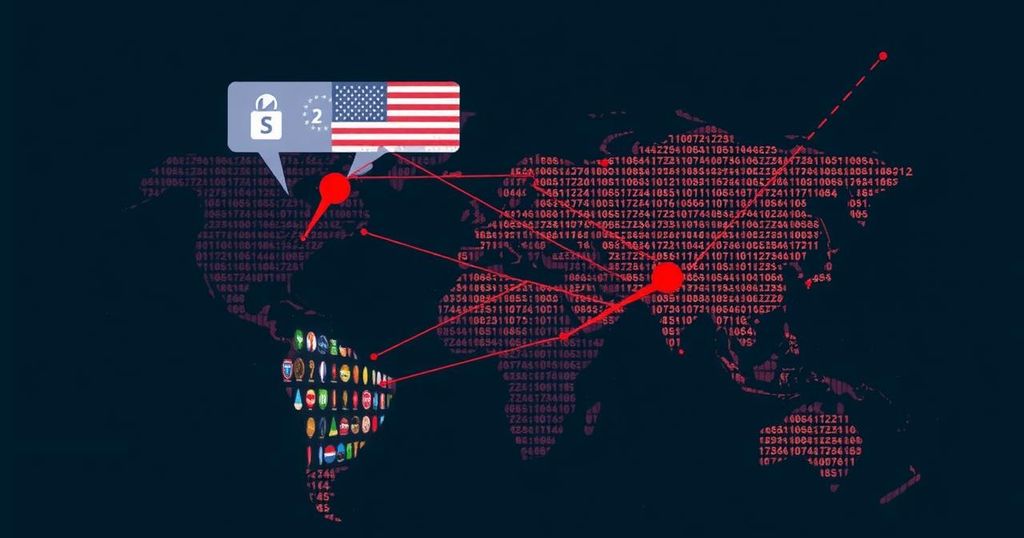Microsoft’s Threat Analysis Center has issued a warning about ongoing foreign disinformation campaigns from Russia, China, and Iran aimed at influencing the upcoming U.S. presidential elections. The report emphasizes the need for vigilance due to the rising sophistication of these tactics, which seek to undermine voter confidence and electoral integrity, particularly around Election Day. Significant efforts are noted against various campaigns, and past patterns of disinformation persist, prompting stakeholders to prepare for potential disruptions.
As the United States approaches the November 5 elections, Microsoft’s Threat Analysis Center (MTAC) issued a warning regarding ongoing foreign disinformation campaigns aimed at undermining the electoral process. The report highlights the persistence and adaptability of malicious activities orchestrated by foreign entities, particularly from Russia, China, and Iran, all of which are employing increasingly sophisticated methods to sow discord and mistrust among voters. Despite the heightened tensions in the Middle East, Iranian operatives continue to target the U.S. electoral landscape, with specific efforts directed toward the Trump campaign and the potential incitement of anti-Israel sentiments. Concurrently, Russian disinformation campaigns have concentrated on the political adversaries of the Harris campaign, utilizing tactics such as character assaults and artificial intelligence-generated content, including deepfakes. Moreover, the Chinese influence has shifted in emphasis to focus on lower-tier Republican candidates and current representatives whose policies clash with China’s strategic interests. MTAC states that it is almost certain these foreign actors will endeavor to amplify doubts regarding the security of the vote during Election Day and within its immediate aftermath. The report elucidates that, as observed in the preceding 2020 presidential election cycle, foreign adversities will likely escalate claims of electoral fraud and integrity issues to generate confusion and erode both domestic and international confidence in the U.S. political system. Looking into the future, particularly as the 2024 campaign season approaches its conclusion, MTAC anticipates the continued deployment of AI-generated media, especially since such content can proliferate swiftly around critical electoral periods. Furthermore, Iranian actors have been noted to probe election-specific platforms, indicating preparations for more overt influence efforts as the election date looms. Chinese-backed operatives have also been observed actively targeting U.S. congressional races, portraying corruption allegations against politicians such as Barry Moore and U.S. Senators Marsha Blackburn and Marco Rubio to manipulate voter perceptions. While not all disinformation campaigns yield substantial results, MTAC emphasizes that even minor narratives can exert significant influence, given their potential to disrupt public discourse surrounding the election. The capacity of foreign entities to disseminate misleading content efficiently is a concern for electoral integrity, a sentiment echoed by Clint Watts, MTAC’s general manager, who remarked, “History has shown that the ability of foreign actors to rapidly distribute deceptive content can significantly impact public perception and electoral outcomes.” Therefore, voters, election officials, and candidates must exercise vigilance against online disinformation, particularly within the critical timeframe leading to and following Election Day.
The issue of foreign interference in U.S. elections has been a growing concern, especially highlighted during the 2016 and 2020 presidential elections. With the rise of the internet and social media, malicious actors have increasingly utilized these platforms to influence public opinion and election outcomes. Microsoft, as a major technology provider, closely monitors these threats through its Threat Analysis Center to ensure the integrity of electoral processes and protect democratic institutions. The report serves as a prompt to all stakeholders in the electoral process to be aware of and prepare against potential disinformation campaigns that could disrupt democratic stability and erode public trust in the electoral system.
In conclusion, the warnings issued by the Microsoft Threat Analysis Center signify a critical alert regarding ongoing foreign disinformation tactics targeting the U.S. electoral process as November 5 approaches. The continuous operations by adversarial nations such as Russia, China, and Iran underline the evolving complexity and urgency of the issue. It is imperative for all entities involved in the electoral process to remain vigilant and proactive in countering these malevolent efforts to safeguard the integrity of the upcoming elections and maintain public trust in the democratic process.
Original Source: www.wired.com






